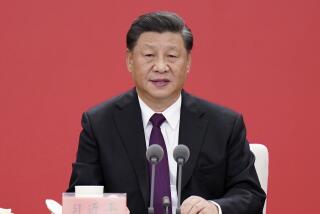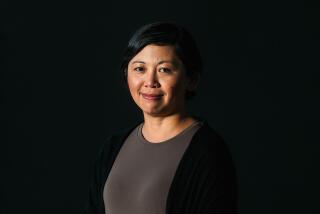The Obmudsman of China : A HIGHER KIND OF LOYALTY <i> by Liu Binyan (Pantheon Books: $22.95; 304 pp.) </i>
- Share via
“Whenever he writes something, chaos ensues.” The complaint is registered by a distressed bureaucrat who has fallen victim to the expose journalism of China’s most widely read and respected author, Liu Binyan.
Liu, presently in exile in the West, has been an “investigative reporter” in a country where that phrase is close to an oxymoron. In the People’s Republic of China, journalists know that the word propaganda has no negative connotation, at least not in officialdom. Censorship is taken for granted. “The press should unconditionally propagate the party line and policy and should perform the role of the prty’s spokesmen,” central committee directives unblushingly dictate.
When Fox Butterfield went to Beijing as correspondent for the New York Times in 1979, the Chinese were baffled to find that he had a room in the Peking Hotel. “Why don’t you live in the American Embassy?” they asked him, unwilling to believe that the New York Times was not part of the American government.
Not surprisingly, Chinese newspapers lack credibility. In a survey taken by one newspaper--published in the relatively open atmosphere of the mid-’80s--readers agreed almost unanimously that the most useful information in the print media was the weather forecast. About 10 years ago, the nation’s editors addressed the public’s complaints of distrust of, and near-terminal boredom with, the daily fare of happy news about soybean crops and socialist rectitude.
The result was a flurry of stories highlighting strange phenomena, articles that were designed to please readers without offending censors. There were reports of a mermaid, of Chinese children who could read with their armpits, and of tall, hairy primates who built campfires and knew how to weave bamboo.
More important, a genre of writing known as “literary reportage” (baogao wenxue) was inaugurated. And with the blessing of the party a small coterie of muckraking reporters was commissioned to uncover corruption in high places. It was here, beginning in 1979, that Liu Binyan was to make his mark as a writer for the People’s Daily, the nation’s and the party’s flagship newspaper and his entree to institutions everywhere.
It is not so strange that the party would encourage tough investigative reporting. In addition to revitalizing popular interest in the official press, it would demonstrate that the leadership cared. In 1979, Deng Xiaoping possessed only a shaky control over a bureaucracy that was still riddled with Maoist ideologues and other holdovers of the Cultural Revolution era. Deng’s new power base would be strengthened in direct proportion to the unmasking of these retrograde elements. Naturally, however, exposing shortcomings in the system must not be confused with criticizing the system itself.
But who could be more reliable than Liu Binyan? Liu was at once an ardent party man and a long-suffering victim of Maoist excesses.
Born in 1925, Liu was still a teen-ager when he began printing and distributing anti-Japanese leaflets in occupied China. At 20, he was accepted into the party, where his writing talents were soon recognized.
In 1955, at age 30, he was attacked for the first time by the literary watchdogs of the party. He survived, but in 1957, during Mao’s “Hundred Flowers” campaign, launched to encourage greater freedom of expression, Liu’s writings were found to “exaggerate” the party’s defects. He had gone too far, crossed the line and produced “poisonous weeds” instead of flowers.
Labeled a rightist counterrevolutionary and expelled from the party, Liu entered a 22-year period of internal exile and forced labor. “I had been at the height of popularity, considered a ‘vanguard’ of our age,” he writes. And then, “overnight, I became the detested ‘enemy of the people.’ ”
From 32 years old until 54, he was not allowed to write. Compared to those who were tortured or sentenced to long jail terms or hounded to death, “I was lucky,” he says. Still, there was tedious and exhausting manual labor, dragging 660-pound night-soil carts from city to countryside. And there was the endless humiliation of self-criticism sessions, and separation from his wife and children.
Like many other intellectuals, Liu was rehabilitated, returned to his profession and to the good graces of the party after Deng Xiaoping’s rise to power. The lost decades of his life did not jar his faith in Marxist ideals, and in 1979, Liu was once again championing the cause of the wronged and helpless.
His “People or Monsters?” which appeared in the September, 1979, issue of People’s Literature documented the corrupt machinations of party cadres in Binxian County near Harbin in the northeast. “The party controls everything; the only thing it does not control is itself,” Liu wrote.
The article brought down a squalid dynasty of local power holders who had been immune from criticism for 34 years. Reprinted and broadcast on the radio throughout the country, Liu’s story created a sensation. Letters poured into his office saying, “You write about Binxian, but the same thing is happening right here where we are!”
Throughout the early 1980s, Liu became a kind of one-man journalistic ombudsman settling scores for victims of the system. Long lines of petitioners crowded the entrance to greet him at the People’s Daily each morning, and besieged his apartment in the evening. Approximately half of “A Higher Kind of Loyalty” is a riveting case-by-case narrative of Liu’s investigations of the petty and not-so-petty tyrants, profiteers, embezzlers, confidence men and zealots, who represent the seamy side of China’s socialist elite.
Some of the cases involve bureaucratic venality that gives extended meaning to Orwell’s “1984.” When a corrupt band of provincial party leaders could not silence the criticisms of a certain Wang Fumian, and could not make criminal charges against him stick, they had him put away in a mental institution for life. Liu interviewed Wang, found him both sane and logical, and discovered that he had been diagnosed as suffering from “mania” by a panel of physicians led by a veterinarian turned psychiatrist.
Incredibly, it was the provincial Security Bureau that provided guidelines for the medical board. In its “Criteria for Diagnosing Mental Diseases,” mania was defined as a “rare kind of mental disease.” Its symptoms: “overconfidence, extreme willfulness, found mostly in people of advanced cultural background. . . . Taken for normal at an early age, the patient gradually asserts his (her) willpower more and more forcibly, (and) he (she) rushes about offering petitions, writing endless letters of accusation.” This is the exact language that the party had used for years to condemn anyone with “independent thinking,” Liu notes.
But, as the author observes, the political climate of China is uncertain--”sunshine one day, rain the next”--and Liu’s career seems to be an all too reliable barometer of the changing weather. In 1987, Liu was again accused of going too far, or promoting chaos. More specifically, hard-line party officials charged him with helping to inspire student protests.
Once again, he was dismissed from the Party. This time, the results were not personally so destructive to Liu. When Harvard University offered him a Nieman fellowship in 1988, Liu was able to accept it--”thanks to the persuasiveness of Harrison Salisbury” is all that he says by way of explanation.
Nearly every page of this moving book expresses the moral fervor of Liu Binyan and the gradual erosion of “one kind of loyalty” that had been misplaced in his youth. “My generation has thrown itself into the struggle led by the Communist Party,” Liu concludes, “in the hope that our children will lead a better life, and now it is precisely the best and brightest of their generation who had died at the butcher’s hands, or are fugitives fleeing from arrest.”
More to Read
Sign up for our Book Club newsletter
Get the latest news, events and more from the Los Angeles Times Book Club, and help us get L.A. reading and talking.
You may occasionally receive promotional content from the Los Angeles Times.









